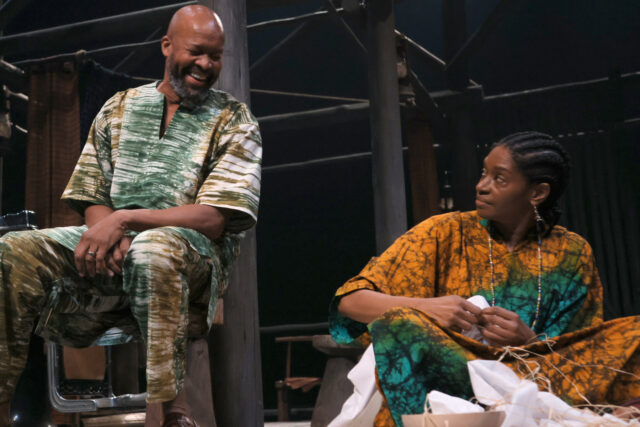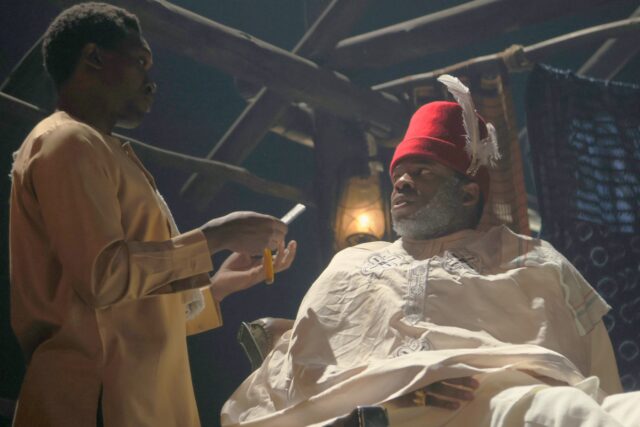
Makuri (Leon Addison Brown) and Alu (Jenny Jules) wait for their son to return in The Swamp Dwellers (photo by Hollis King)
THE SWAMP DWELLERS
Theatre for a New Audience, Polonsky Shakespeare Center
262 Ashland Pl. between Lafayette Ave. & Fulton St.
Tuesday – Sunday through April 27, $902-$132
www.tfana.org
Wole Soyinka, the first African to win the Nobel Prize for Literature, packs a lot of potent story into the seventy-minute one-act play The Swamp Dwellers, receiving its off-Broadway premiere at Theatre for a New Audience’s Polonsky Shakespeare Center, but it can’t quite stand on its own; instead, the quality production feels like the middle section of a larger work, with too much left unsaid.
The action takes place on Jason Ardizzone-West’s gorgeous set, in a hut constructed with marsh stakes and hemp rope, built on stilts in a small village along the Niger Delta; water shimmers under and around the abode. It’s the late 1950s, shortly before Nigeria will gain its independence from Britain on October 1, 1960, a time of major change that Soyinka relates through one family.
Sixtysomething couple Alu (Jenny Jules) and Makuri (Leon Addison Brown) are struggling to get by; she dyes Yoruba textile cloths while he is a barber and basket weaver. Their twin sons, Igwezu (Ato Blankson-Wood) and Awuchike, have left for the city, seeking wealth; While Igwezu has just returned and is checking to see if anything is left of his farmland, Awuchike is probably dead, according to Alu.
Alu and Makuri love each other, but each enjoys needling the other, as in this marvelous exchange:
Alu: If you had any good at all in you, you’d go and look for him.
Makuri: And catch my death of cramp? Not likely . . . And anyway, what’s preventing you from going?
Alu: I want to be here when he gives me the news. I don’t want to fall down dead out in the open.
Makuri: The older you get, the more of a fraud you become. Every day for the past ten years, you’ve done nothing but swear that your son was dead in the marshes. And now you sit there like a crow and tell me that you’re waiting for news about him.
Alu: I know he’s dead.
Makuri: Then what do you want Igwezu to tell you?
Alu: I only want to know if . . . I only want to ask him . . I . . . I . . . He shouldn’t have rushed off like that . . . dashing off like a madman before anyone could ask him a thing.
Makuri: Before anyone could ask him WHAT?
Alu: You’re always trying to make me a liar.
Makuri: I don’t have to make you one.
Alu: Bah! Frog-face! . . . Dropped his bundle and rushed off before I could ask him a thing . . . And to think he could have found him after all. To think he could have found him in the city.
Makuri: Dead men don’t go to the city. They go to hell.
Alu: I know one dead man who is sitting right here instead of going quietly to hell.
Makuri: Now see who is calling who . . .
Alu: You’re so useless now that it takes you nearly a whole week to make one basket . . . and to think you don’t even cut your own rushes!
Makuri: If you had to get up so often to shave the heads of the whole village . . . and most of them crusted with kraw-kraw so that a man has to scrape and scrape until . . .
[Alu yells suddenly and slaps herself on the arm.]
Makuri: Ha! Don’t tell me now that a fly has been trying to suck blood from your dried-up veins.
Alu: If you had enough blood to hold you up, you’d prove it by going to look for your own son, and bring him home to supper.
A blind Muslim beggar (Joshua Echebiri) arrives, having traveled far to seek employment, wanting to work the soil with his hands. He lost his sight to the fly sickness when he was a child; the mention of the word “fly” instantly recalls the flies that taunt Alu, as if potential illness hovers around her.
While the beggar learns about how floods ruined the family’s farm, the local holy man, known as the Kadiye (Chiké Okonkwo), the Servant and Priest of the Serpent of the Swamp, visits with his attendant (Jason Maina) and drummer (Olawale Oyenola). The Kadiye announces that the rains have stopped and planting can begin again. Makuri caters to him, insisting that the Kadiye sit in the fancy swivel barber chair and demanding that Alu bring them drink.
After the Kadiye leaves, Igwezu enters, bitter and distant. The beggar tells him he wants to be his loyal bondsman while also planting a seed that the Kadiye may be corrupt. “How does the Serpent fare in times of dearth? Does he thrive on the poisonous crabs? Does he drink the ooze of the mire?” the beggar asks. Makuri resonds, “Beware. That borders upon sacrilege. That trespasses on the hospitality of this house.” Igwezu wonders, “Perhaps he can give meaning to what seems dark and sour.”
When Kadiye and his attendants return, Igwezu details what happened between him and his brother and questions the holy man as he prepares to shave him, razor at the ready.

Igwezu (Ato Blankson-Wood) prepares to shave the Kadiye (Chiké Okonkwo) in Wole Soyinka off-Broadway premiere (photo by Hollis King)
Born in British Nigeria in 1934, Soyinka wrote The Swamp Dwellers, his second play, in 1958. He would go on to write such other works as The Lion and the Jewel, The Invention, The Interpreters, and Season of Anomy. In The Swamp Dwellers, he explores such issues as colonialism, systems of faith, infidelity, the ecosystem, and revenge. It’s a lot to take on in seventy minutes, and as compelling as it is under the direction of Awoye Timpo (Wedding Band, Elyria), some elements feel like they need more.
Qween Jean’s costumes, Seth Reiser’s lighting, Rena Anakwe’s sound, and Chief Ayanda Clarke’s music help transport the audience to the Niger Delta, where danger and darkness lurk amid the haze; you can practically smell the swamp and fear the serpent. The ensemble cast is led by strong performances by Brown (soft, The Painted Rocks of Revolver Creek) and Jules (Harry Potter and the Cursed Child, Sweat) as the bickering couple, trying their best in a nearly impossible situation, although independence is just around the corner, along with corporate drilling that followed the discovery of oil in the region.
In a December 2010 New York Times piece included in the revival’s online program, Soyinka, who collaborated with TFANA on the revival, remembered being in Nigeria as the extraction phase began, writing, “[Oil] flares signaled at the time nothing more than the mission of the company — to open the land to industrialization. Oil was only the facilitator. . . . The earth of the swamp dwellers was under siege. Eviction; land takeovers; home demolitions; environmental degradation; lost livelihoods: The oil flares were no longer harmless sky-writings but the fires of improvidence and indifference.”
The Swamp Dwellers gives us a glimpse of a world on the brink of dissolution, already starting to slide toward destruction.
[Mark Rifkin is a Brooklyn-born, Manhattan-based writer and editor; you can follow him on Substack here.]